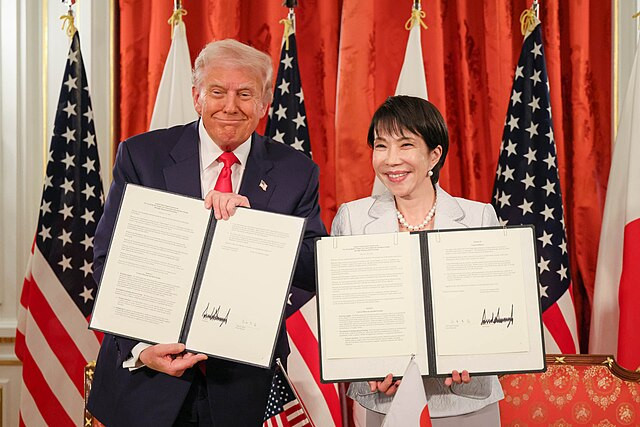President Donald Trump and Japanese Prime Minister Sanae Takaichi have signed a sweeping agreement to expand cooperation on rare earths and critical minerals, a move both leaders described as central to reducing dependency on China and strengthening U.S.-Japan economic and security ties.
The signing ceremony took place at the Akasaka Palace in Tokyo during Trump's three-day state visit, marking Takaichi's first major diplomatic engagement since becoming Japan's first female prime minister. The agreement, focused on securing supply chains for minerals vital to electric vehicles, fighter jets, and semiconductors, signals a deepening alliance between Washington and Tokyo as both nations seek to safeguard key industries from Beijing's export leverage.
"Everything I know from Shinzo and others, you will be one of the great prime ministers," Trump said during their bilateral talks, referencing former Japanese leader Shinzo Abe, who had cultivated a close personal relationship with Trump before his 2022 assassination. The U.S. president also congratulated Takaichi for breaking Japan's gender barrier in leadership, calling her election "a big deal."
Takaichi, a conservative ally of Abe known for her assertive stance on defense and trade, confirmed Japan's intention to raise defense spending to 2% of GDP. She further announced her plan to nominate Trump for the Nobel Peace Prize, citing his "efforts in brokering ceasefires in Asia and the Middle East."
The prime minister unveiled a $550 billion investment package designed to strengthen bilateral trade. The initiative includes shipbuilding partnerships and significant purchases of U.S. soybeans, natural gas, and pickup trucks - measures analysts say will help stabilize Japan's economy while advancing Trump's export agenda.
The rare earths pact commits both nations to identifying and developing new projects in mining, magnet production, and battery technology within six months. It also outlines the establishment of joint strategic reserves for critical minerals, designed to mitigate supply disruptions. Takaichi described the deal as "a new era of cooperation" for both nations, while Trump framed it as part of his ongoing effort to boost U.S. exports and counter China's influence in global trade.
Following the signing, Trump joined Takaichi for a working lunch and a meeting with families of Japanese citizens abducted by North Korea decades ago. "The United States is with them all the way," he said, reaffirming support for Japan's campaign to secure the abductees' return.






